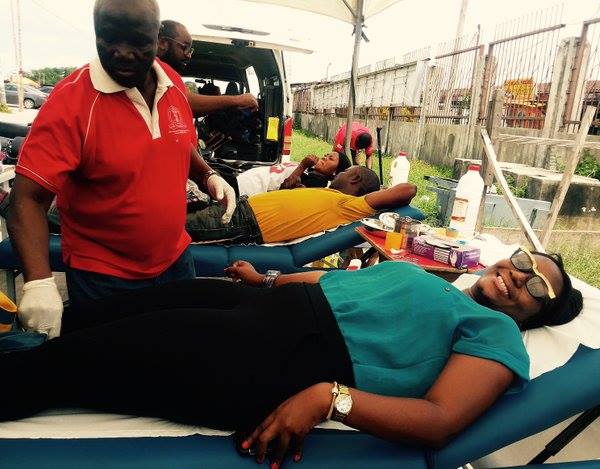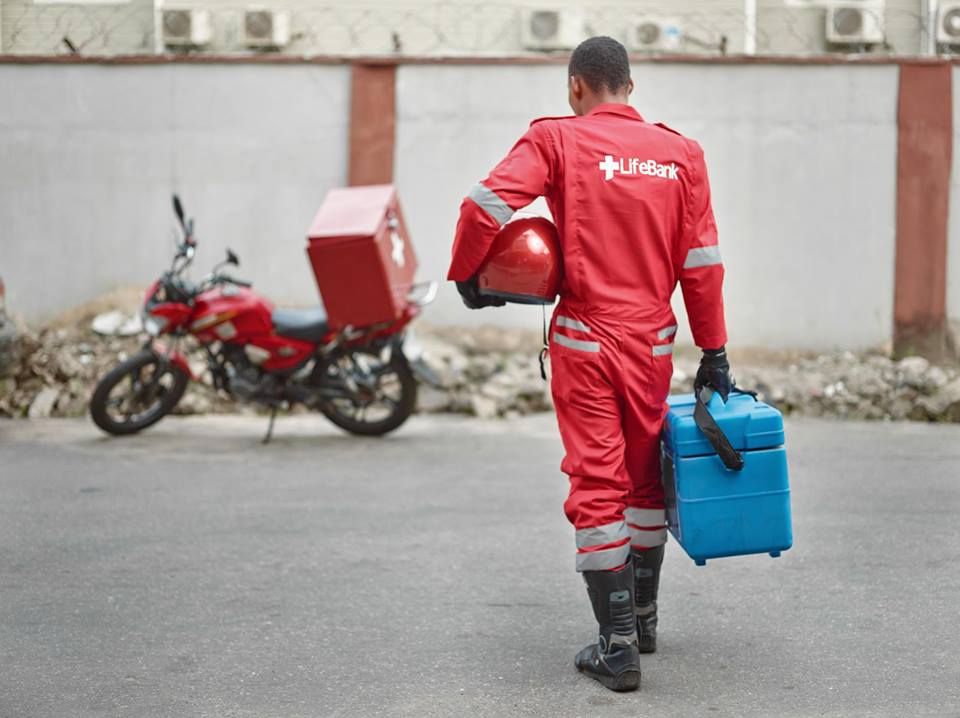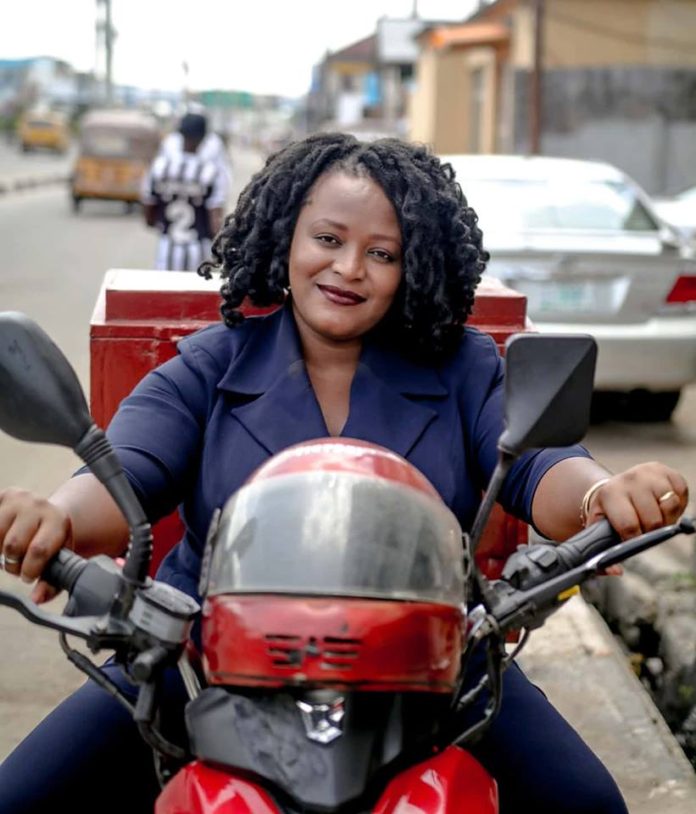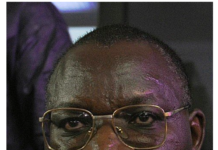Imagine you were born in Nigeria and later moved with your family to the US as a teenager. Imagine you attended the best schools, obtained a couple graduate degrees that placed you in the best position to have any career you wanted. Imagine however that you felt compelled to go back home, to reconnect with your roots, but also to fulfil your sense of purpose, a call of duty awakened in you by the autobiography of Nelson Mandela. Where would you start in this vast country of yours, a diverse and eclectic sub-continent of almost 200 million people?
Today, I am inspired by Temitope (Temie) Oluwaloni Olamide Giwa-Tubosun, of Nigeria. Temie was born on December 4th, 1985, the fourth of six siblings. At the time of her birth, her family lived in a small town called Ìlá Òràngún in south-western Nigeria. Ìlá Òràngún is an ancient city in Osun State; it was once the capital of an ancient city-state of the same name in the Igbomina area of Yorubaland, the cultural region of the Yoruba people which covers part of Nigeria, Togo and Benin. They later moved to Ibadan, home of the oldest University of Nigeria.
Both her parents were educators, her father a University teacher and her mother a teacher. As such, they were very keen to ensure their kids got the proper education. Her family life and quiet upbringing in a rural town was going to drastically change in 1995, when her mother won the US Diversity Immigrant Visa – commonly known as the US green card lottery. Within months, her parents moved to Minnesota with her three older siblings. Temie and her two other siblings stayed with relatives in Ibadan and later joined the rest of the family when she was 14.
The teenage girl was happy to discover the world and broaden her horizon. She attended Osseo Senior High School, in Minnesota from which she graduated in 2003. She proceeded and enrolled in Minnesota State University Moorhead to study Political Science. After completing her Bachelor of Art, Temie did a Certificate of Project Management at the Development Project Management Institute (DPMI), before pursuing a graduate degree at Middlebury Institute of International Studies (MIIS) at Monterey – a graduate school located in Middlebury, Vermont.
 During her graduate studies, Temie was very involved in university life. She coordinated a Model United Nations program for Monterey County, was MIIS Student Council Representative and President of MIIS Afro Club. However, behind the façade, Temie was going through what she calls her dark years. Like a lot of first generation African youth in the west, she went through an identity crisis, wondering where she really belonged.
During her graduate studies, Temie was very involved in university life. She coordinated a Model United Nations program for Monterey County, was MIIS Student Council Representative and President of MIIS Afro Club. However, behind the façade, Temie was going through what she calls her dark years. Like a lot of first generation African youth in the west, she went through an identity crisis, wondering where she really belonged.
“I didn’t know who I was anymore. Was I Nigerian or American?”
This episode of self-doubt went on for about two years till she one day found a copy of ‘Long walk to freedom’, Nelson Mandela’s biography. It was a real lifesaver as it gave her a sense of purpose that was bigger than her life.
“What I got [from Mandela’s story] was a sense of duty to your community.”
What appealed to her was that Mandela’s definition of duty was not one of a Hollywoodian super-hero character with supernatural powers and who would do extraordinary deeds, everyone applauding at the end of the movie. Rather, duty implied working hard to bring your vision to reality.
She knew she needed to do her duty and it was going to involve a lot of work physically, financially and most likely emotionally. In 2009, before completing her Masters, she had an opportunity to go back to Nigeria and reconnect with her roots. She had secured an internship for the Department for International Development (DID) in the country’s capital Abuja, in Northern Nigeria.
It was the first time she had gone back home since she left for the US eight years earlier in 2001. The job placement only lasted three months, but it was going to be one of the most determining times in her life. Before she left for Minnesota at 14, she had only known the southern part of the vast west-African country. Now 22, she finally had a chance to discover other communities in her home country, communities that lived in the cities and towns bordering the francophone Niger. In Nigeria, every region is a country within the country, with as many sub-cultures, ethnic and religious mixes as one can imagine and ecosystems that span from mountains, seas and tropical forests in the south to vast Sahelian like savannahs in the north.
One day, she was in Kano when she met a teenager girl named Aisha. The girl was pregnant and by the time Temie met her, she had been in labour for three days. Temie remembers how courageous she was, not giving up despite the pain, waiting, hoping to get help! Fortunately, did get medical care and was able to deliver her baby. That encounter touched Temie and continued to think about it over the years to come. It was the first time she realised how privileged her life had been.
After that pilgrimage like stay in Nigeria, Temie went back to school to complete her Masters.
In 2010, she obtained a Master of Public Administration and International Management, with a focus on Health Systems Management and Health Financing. She went on to do a career in her chosen field, seeking opportunities that would allow her to expand her understanding of the world. She successively worked with the World Health Organisation in Geneva and the Millennium Villages Project in Ruhiira in Uganda.
In 2012, she returned to her native Nigeria and founded the One Percent Project, a social enterprise dedicated to ensuring that Nigerians, especially women and children, have access to safe blood when they need it. When she first launched it, the One Percent Project served as a platform to educate Nigerians on the importance of donating blood and call for voluntary blood donations across Nigeria. Within three years, One Percent had managed to collect more than 3,100 pints of blood!
Although her initiative was filling that void she had felt in previous jobs, she knew deep inside that it wasn’t exactly capturing ‘her real calling’, the more hands-on call for duty Mandela’s story had awakened in her. She felt as though she was in waiting, waiting for something, a life event perhaps that would direct her to the work she was called upon to do.
That event was going to happen in 2014, on Valentine’s day. No, I am not going to turn all romantic on you and tell you of roses, chocolate boxes and candle light dinners…lol
February 14th, 2014 was all but romantic for Temie, at least not in the way we think. It was the birth of her son. Towards the end of her pregnancy, Temie had left Nigeria and returned to Minnesota, where her parents still lived. Her decision proved to be very wise as it was to be an extremely difficult birth.
 ”I had a very long labour, I almost died, my son almost died.”
”I had a very long labour, I almost died, my son almost died.”
The birth was complicated. The baby, whom she will call Eniafe (“the one we love” in Yoruba), was seven weeks premature and weighed just 2 pounds at birth. Both mother and child required intensive care.
Throughout her labour, she thought of Aisha, the teenage mom she had met in Kano some years back. She knew she was lucky compared to Aisha. Being in the US with her parents at that time, he didn’t have to wait in labour for three days before getting access to a doctor, she had the best possible care and doctors had everything they needed, knowledge wise and technology wise and supply wise to save her and her baby.
“I realized how easy it would have been to die in Nigeria,”
Surviving that event and conscious she might have died if she had given birth in Africa, compelled her to go back to Africa and try to do more for less privileged mothers. The country had a high maternal mortality rate – more than 800 deaths per 100,000 live births – the second highest maternal mortality in the world. According to world health experts, most maternity deaths in Nigeria – 23%, almost one fourth of all maternal deaths – are due the loss of too much blood within 24 hours after a woman has given birth.
Her first move was to completely overhaul her organisation One Percent. It was no longer just going to call upon people to donate blood she was going to take the blood where it was needed. In December 2015, One Percent Project became LifeBank.
In her new approach, Temie wanted to go beyond addressing the problem of shortage, to tackle the problem of access.
“It is more about access not shortage and people not knowing how to donate blood. Blood banks end up throwing away a lot of blood because of the demand and blood mismatch.” Ironically, “people are willing to give blood, but they don’t know how.”
Her solution was very simple: to create an app that would allow to make that connection.
“We use apps and artificial intelligence and data to figure who needs blood, which patients will need plasma, which patients need platelets, which patients will need oxygen.”
The LifeBank app allows medical professionals to order blood from about 25 blood banks in Lagos – a metropole of 20 million people. Orders are filtered by blood type, location and urgency. LifeBank’s logistics team collects the blood and stores the blood in a cool chain system – keeping it at 10 degrees Celsius – and transports the precious supply from the different banks of – to the health care facility where it’s needed. All transports are done in Bluetooth-padlocked boxes that only the intended recipient can open. LifeBank only transports blood that has been screened by state-run clinics, reducing the possibility of blood-transmitted infections entering the chain. LifeBank continues to run the blood drives initiated by One Percent and connects voluntary donors to blood banks.
When you think about it, LifeBank is a real revolution. Not only because it was created by a woman in a country where the voices of women are seldom heard, and not for the fact that is it is giving the health care industry access to reliable and lifesaving data, but because it allows anyone to just click on an app on their mobile phone to save their own life or the life of a loved one.
What drive this extraordinary social entrepreneur, 33 years old CEO of a one-of-a-kind tech start-sup?
Temie confesses that she was at first a very reluctant entrepreneur as that wasn’t the path she had originally selected for herself. However, she knew she had to think outside the box, outside the way businesses and organisations worked if she wanted to see the change she aspired to.
Since she went on to venture on her own in 2012, Temie was driven by two things: the belief that healthcare is a right, and that entrepreneurship is not just about money, it must be about humanity:
“I have a conviction that businesses with a social mission will save the world and I set out to prove this with LifeBank.”
She is also conscious that the world around Africa is changing to the detriment of the motherland, and all Africans can play a role to strengthen the continent’s ailing infrastructures.
“As an American and as a Nigerian, I see something happening in the world. The western world is moving towards isolation. They are less liberal than they used to be. What it tells me, there is an urgency to make our continent [Africa] work for all, for the vulnerable, the weak for the mothers for the children, for all the Aisha in our continent.”
LifeBank is very proud of its achievements and high professional standards. The start-up works with 40 blood banks located in different areas of Lagos, making it possible to make all deliveries in good condition and within an hour. The social enterprise delivers an average of 300 pints of blood a month to more than 170 hospitals across Lagos state. To this date, LifeBank has moved about 10 000 products, served about 400 hospitals, collected blood from 5700 voluntary donors and saved about 2000 lives!
All of that with a team of … 7 people!
In the coming months, Temie plans to expand her services to three more states and is already looking at offering her services in other African countries.
BBC was right when they listed her in 2014, before she even created LifeBank, as one of the 100 Women changing the world. In May 2017, she was recognised by both the World Economic Forum on Africa – which selected her as part of six entrepreneurs who demonstrate the positive role women are playing in creating opportunities and preparing the region for the Fourth Industrial Revolution, and by Quartz, which included her in their annual African Innovators List of more than 30 Africans who are taking leadership and control in a wide range of fields including finance, healthcare, education, agriculture, design.
LifeBank and her founder Temie Giwa-Tubosun has also earned the praises of none other than Marc Zuckerberg, who met her as he was touring the world last year. The founder and CEO of Facebook estimates that the techpreneur created a model that can impact not just Lagos, not just Nigeria, but countries all around the world.
Right Your Legacy, Mrs Chief Executive Officer! You are an inspiration to all the aspiring tech-preneurs of the continent and a lifeline to all the mothers, infants, people injured every day on our dangerous roads, all who might otherwise suffer the most senseless fates.
Source: Um’Khonde Habamenshi
































































